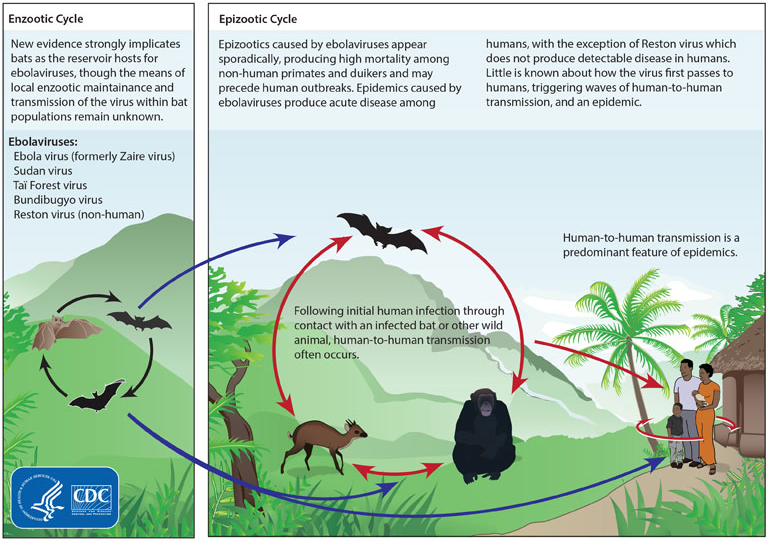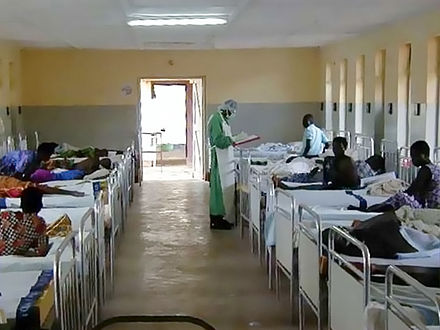Ebola
Ebola, also known as Ebola virus disease (EVD) or Ebola hemorrhagic fever (EHF), is a viral hemorrhagic fever affecting humans and other primates, caused by ebolaviruses. The disease typically presents with fever, sore throat, muscle pain, and headaches, progressing to vomiting, diarrhoea, rash, and decreased liver and kidney function. In severe cases, internal and external bleeding occurs. The mortality rate ranges from 25% to 90%, with an average of about 50%.

Signs and Symptoms
The incubation period of Ebola ranges from 2 to 21 days, commonly between 4 and 10 days. The initial phase is characterised by influenza-like symptoms such as fatigue, fever, decreased appetite, muscle and joint pain, headache, and sore throat. Fever above 38.3°C (101°F) is typical. Gastrointestinal symptoms like nausea, vomiting, diarrhoea, and abdominal pain often follow. Severe dehydration is common due to the combination of vomiting and diarrhoea. Shortness of breath, chest pain, and a maculopapular rash may develop. In about half of the cases, internal and external bleeding, including bleeding from mucous membranes and sites of needle punctures, can occur.

Diagnosis
Laboratory testing is very important for diagnosing Ebola. Non-specific indicators include a low platelet count, initially decreased but subsequently increased white blood cell count, elevated liver enzymes, and abnormalities in blood clotting. Specific diagnosis is confirmed by isolating the virus, detecting viral RNA or proteins, or antibodies in blood samples. Real-time PCR and ELISA are commonly used diagnostic methods, especially in field or mobile hospitals. A rapid antigen test, providing results in 15 minutes, was approved by WHO in 2015.
Transmission
Ebola spreads through direct contact with body fluids of an infected person or through contact with contaminated objects. Body fluids that may contain Ebola viruses include saliva, mucus, vomit, faeces, sweat, tears, breast milk, urine, and semen. The virus can survive on surfaces for a few hours in a dried state and a few days in body fluids. The primary natural reservoir is believed to be fruit bats, which can spread the virus without being affected. Human-to-human airborne transmission has not been reported in outbreaks, although it has been demonstrated in laboratory settings from pigs to primates.

Treatment
Treatment is primarily supportive. Early supportive care with rehydration and symptomatic treatment improves survival. This includes oral or intravenous fluids, pain management, and treatment for nausea, fever, and anxiety. Blood products such as packed red blood cells, platelets, or fresh frozen plasma may be used. Two treatments, atoltivimab/maftivimab/odesivimab and ansuvimab, have shown improved outcomes. An Ebola vaccine, rVSV-ZEBOV, was approved in the United States in December 2019 and has been effective in preventing the disease.

Prevention
Preventive measures include wearing proper protective clothing, handwashing, avoiding direct contact with infected individuals, and safe handling and cooking of bushmeat. For healthcare workers, strict adherence to infection control measures and appropriate use of personal protective equipment (PPE) are very important. Dead bodies remain infectious, necessitating proper handling and burial practices to prevent transmission.

Self-assessment MCQs (single best answer)
What is the typical mortality rate range for Ebola virus disease (EVD)?
What is the incubation period for Ebola?
Which of the following symptoms is NOT commonly associated with the initial phase of Ebola virus disease?
What laboratory method is commonly used for the rapid diagnosis of Ebola in field settings?
Which of the following body fluids is NOT a known medium for Ebola virus transmission?
What is considered the primary natural reservoir for the Ebola virus?
Which treatment has been approved and shown to improve outcomes in Ebola patients?
When was the Ebola vaccine, rVSV-ZEBOV, approved in the United States?
Which of the following measures is NOT typically recommended for the prevention of Ebola transmission?
What is a common complication that can occur in severe cases of Ebola virus disease?
Dentaljuce
Dentaljuce provides Enhanced Continuing Professional Development (CPD) with GDC-approved Certificates for dental professionals worldwide.
Founded in 2009 by the award-winning Masters team from the School of Dentistry at the University of Birmingham, Dentaljuce has established itself as the leading platform for online CPD.
With over 100 high-quality online courses available for a single annual membership fee, Dentaljuce offers comprehensive e-learning designed for busy dental professionals.
The courses cover a complete range of topics, from clinical skills to patient communication, and are suitable for dentists, nurses, hygienists, therapists, students, and practice managers.
Dentaljuce features Dr. Aiden, a dentally trained AI-powered personal tutor available 24/7 to assist with queries and provide guidance through complex topics, enhancing the learning experience.
Check out our range of courses, or sign up now!


